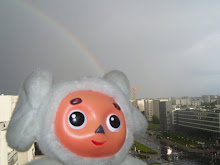Friday, July 24, 2009
Film Review: Mała Moskwa
Sunday, July 12, 2009
Lato Filmów and Movie Theaters in General
Sunday, May 24, 2009
Cinematics
I haven't seen tons of Polish movies, but I like to think I've seen the ones that count (and then some.) The classics like Pan Tadeusz, Ziemia Obiecana, Ogniem i Mieczem, and Katyn are must-sees to anyone wanting to learn more about Polish culture.
Pan Tadeusz is often called the national novel (or, more accurately, epic poem) of Poland (although, it takes place in Lithuania.) To be clear, I've never actually read the work or any translation of it, but what I have seen of it reminds me of Dante's masterpiece, The Divine Comedy (probably because of the rhyming.) Anyway, I downloaded and saw the 1999 film with several Poles, and afterwards remarked, "Hmmm, that really wasn't worth the time and effort to download, was it?" This made one of the Poles incredibly angry, blasting me for not caring about Polish history or suffering (this is how passionate Poles are about this poem and how much they resent the partitions of Poland.)
But, c'mon, this movie isn't really that great and the story actually kind of sucks. The production quality, especially the 'battle' scenes, is below that of Gettysburg (a movie I actually like very much) but that's really not the issue. The titular character, Pan Taduesz, is not even the main character and only demands about 25% of the plot line. He's also not really the most admirable or interesting character, and his most notable achievement is being able to nail some older noblewoman (who is actually kind of a conniving bitch) while trying to woo her niece. Pan Tadeusz is actually the most bland character in the whole production and the entire storyline would have suffered little if he was removed entirely (they could have stitched it together.) Mostly the film centers on the squabbling of two minor szlachta families, the Soplicas and the Horeszkos, over some ruin of a castle. What it does do is underline how the bickering of the szlachta allowed Poland to carved up and eventually erased from the map. The biggest kick in the balls is that the film abruptly ends when the movie starts getting interesting (when they start fighting the Russians instead of bitching at each other over family honor.) I've been told that the film doesn't do justice to the poem, and that it's really a great read (something I won't bring into dispute.)
The other films, like Ziemia Obiecana (The Promised Land), which portrays the hopes and ravages of the industrial revolution, are remarkably better. Katyn is the best of the lot, with Ogniem i Mieczem (With Fire and Sword) falling more towards Pan Tadeusz, but not really falling to that depth (it's a good watch.) Katyn is the heart-wrenching, and reminds me of the great, Schindler's List. Most of these films are downers and all the main characters end up "bummed out."
On the other side, I have actually seen Mala Wielka Milosc (Little Great Love.) A Polish-American RomCom, it proves that the Polish can make comedies almost as insipid as the Americans (they have a ways to go to reach the suckitude of Freddy Got Fingered and EuroTrip. For a good romantic comedy, watch High Fidelity.) A predictable storyline about an up-and-coming big shot lawyer who learns about responsibility, humility, and love from a down-to-earth Polish girl by knocking her up. He loses all his possessions, but in reality gains everything meaningful in life. He also has a fat, stupid sidekick bestfriend.
This summer, I hereby pledge to go on a Polish movie binge and see what I can so I can really put my ax to the grindstone. I can't wait to see the promising crapfest of To Nie Tak Jak Myslisz, Kotku (It's not what you think, Dear. (Kotku is actually the diminutive of kot (cat) but in this sense it can be translated as 'dear.')) Also, the even more terrible-looking Idealny Facet Dla Mojej Dziewczyny (The Ideal Guy for My Girl) is something I can't wait to sink my teeth into (some naked chick was on the posters; that pretty much says it all.)
The film, Wojna Polsko-Ruska (The Russo-Polish War), looks to be rather good. I've heard that the book is quite good and one of the best Polish books of the past decade. We shall see.



